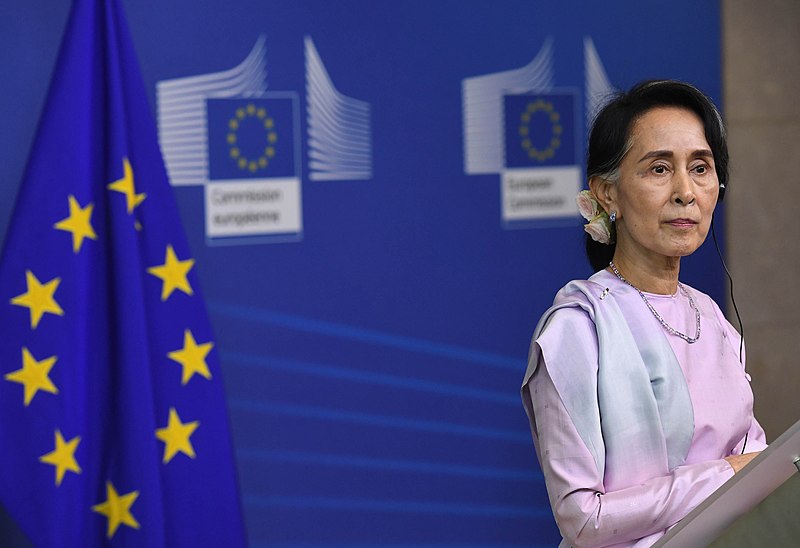Ousted Myanmar leader Aung San Suu Kyi was convicted by a junta court on three criminal charges. From the conviction, Suu Kyi received a four-year prison sentence.
Suu Kyi was convicted of three new criminal charges Monday, receiving a four-year prison sentence according to Myanmar’s junta court. The ousted leader was found guilty of two charges in relation to illegal importing and owning walkie-talkies and one charge of breaking COVID-19 protocols.
A person familiar with the matter told AFP that the walkie-talkie charges stemmed from the day of the coup when troops raided her home and discovered the equipment.
Suu Kyi has been detained since February 1 last year when the country’s generals staged a coup against Suu Kyi’s democratic government. The coup staged by the military generals resulted in widespread dissent and unrest. This also led to a bloody crackdown that saw mass detentions and over 1,400 civilians were killed.
The latest convictions add to the sentencing Suu Kyi received back in December. Suu Kyi was charged for incitement and for breaching COVID-19 restrictions while campaigning. Junta chief Min Aung Hlaing reduced Suu Kyi’s sentencing to two years under house arrest in Naypyidaw.
The ruling Suu Kyi received back in December drew backlash from the international community and citizens of Myanmar showed their outrage through banging pots and pans. Human Rights Watch researcher Manny Maung said that any more convictions against Suu Kyi would only exacerbate public discontent. Maung told AFP that the last conviction angered the public and that the military sees the cases as a fear tactic, only to receive more backlash from the public.
Previously, Al Jazeera reported that the Myanmar military killed over 30 civilians in their vehicles on Christmas eve, leaving the burned bodies to the extent of being unrecognizable. The move by the military aimed to counter the growing resistance to the extent that they have also blocked citizens’ access to basic necessities as part of its “four-cuts” strategy that has long been used to dismantle the support for ethnic armed groups.
The recent killings added to the death toll from the crackdown staged in February, but have also led to an accelerated armed resistance to counter the military since May.



 Trump Announces U.S. Strikes on Iran Navy as Conflict Escalates
Trump Announces U.S. Strikes on Iran Navy as Conflict Escalates  UK Accepts U.S. Request to Use British Bases for Defensive Strikes on Iranian Missiles
UK Accepts U.S. Request to Use British Bases for Defensive Strikes on Iranian Missiles  U.S. Lawmakers Question Trump’s Iran Strategy After Joint U.S.-Israeli Strikes
U.S. Lawmakers Question Trump’s Iran Strategy After Joint U.S.-Israeli Strikes  Pentagon Leaders Monitor U.S. Iran Operation from Mar-a-Lago
Pentagon Leaders Monitor U.S. Iran Operation from Mar-a-Lago  Trump Says U.S. Attacks on Iran Will Continue, Warns of More American Casualties
Trump Says U.S. Attacks on Iran Will Continue, Warns of More American Casualties  Macron Urges Emergency UN Security Council Meeting as US-Israel Strikes on Iran Escalate Middle East Tensions
Macron Urges Emergency UN Security Council Meeting as US-Israel Strikes on Iran Escalate Middle East Tensions  Middle East Conflict Escalates After Khamenei’s Death as U.S., Israel and Iran Exchange Strikes
Middle East Conflict Escalates After Khamenei’s Death as U.S., Israel and Iran Exchange Strikes  EU Urges Maximum Restraint in Iran Conflict Amid Fears of Regional Escalation and Oil Supply Disruption
EU Urges Maximum Restraint in Iran Conflict Amid Fears of Regional Escalation and Oil Supply Disruption  Trump Warns Iran as Gulf Conflict Disrupts Oil Markets and Global Trade
Trump Warns Iran as Gulf Conflict Disrupts Oil Markets and Global Trade  Russia Signals Openness to U.S. Security Guarantees for Ukraine at Geneva Peace Talks
Russia Signals Openness to U.S. Security Guarantees for Ukraine at Geneva Peace Talks  HHS Adds New Members to Vaccine Advisory Panel Amid Legal and Market Uncertainty
HHS Adds New Members to Vaccine Advisory Panel Amid Legal and Market Uncertainty  Iran Supreme Leader Ayatollah Ali Khamenei Killed in Israeli, U.S. Strikes: Reuters
Iran Supreme Leader Ayatollah Ali Khamenei Killed in Israeli, U.S. Strikes: Reuters  Why did Iran bomb Dubai? A Middle East expert explains the regional alliances at play
Why did Iran bomb Dubai? A Middle East expert explains the regional alliances at play  Netanyahu Suggests Iran’s Supreme Leader Khamenei May Have Been Killed in Israeli-U.S. Strikes
Netanyahu Suggests Iran’s Supreme Leader Khamenei May Have Been Killed in Israeli-U.S. Strikes  Trump Says U.S. Combat Operations in Iran Will Continue Until Objectives Are Met
Trump Says U.S. Combat Operations in Iran Will Continue Until Objectives Are Met  Trump to Address Nation as U.S. Launches Strikes in Iran, Axios Reports
Trump to Address Nation as U.S. Launches Strikes in Iran, Axios Reports 































